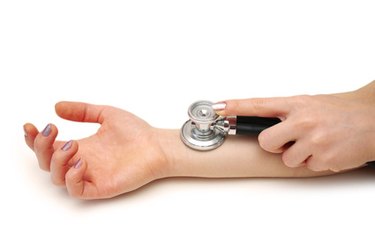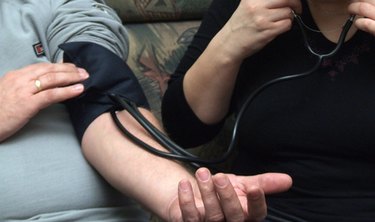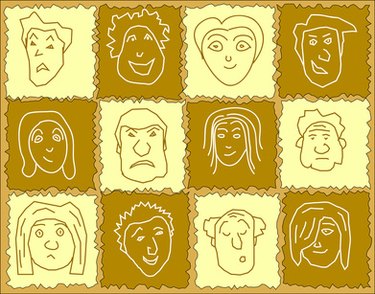
If you've ever had an illness, you know that most changes that happen to one organ system cause a cascade of effects on other systems. For instance, when you have the flu, the causative germ makes your temperature rise, which makes you shiver, which makes it difficult to sleep and keeps you awake to feel all the aches and pains the flu brings with it. This domino effect also takes place between dehydration and heart beat. The cause, dehydration, has the effect on the heart of making it beat faster.
Significance
Video of the Day
A rapid heart rate, called tachycardia, quickly impairs a heart's efficiency. According to "Current Medical Diagnosis and Treatment, 2010," while at first the speed of the heart pumps more blood, it tires and becomes inefficient over time. Dehydration, a dangerous metabolic state, becomes more serious when coupled with a racing heart.
Video of the Day
Definition of fast heart rate

The normal heart rate falls between 80 and 100 beats per minute, BPM. According to "Dorland's Illustrated Medical Dictionary," 31st ed., a person has tachycardia when the heart beat exceeds a sustained rate of 100 BPM. Symptoms that accompany a rapid heart beat include awareness of the heartbeat, excessive sweating, fatigue or weakness, shortness of breath, chest pain, lightheadedness, dizziness, fainting and other symptoms. Some people have no symptoms at all, according to DiscoveryHospital.com, 2010. Many factors can cause a tachycardic heart; some result from a diseased heart while others come from causes outside of the cardiac system.
Definition of dehydration
In the case of dehydration, an event or condition has depleted the body of vital fluids or caused an imbalance of the mineral electrolytes that govern the interaction of the body's fluids. Causes include heat exposure, diarrhea, chronic kidney disease, diabetes insipidus, an overabundance of sodium and enteral nutritional support, according to Current MD&T, 2010.
Linking the two conditions

When a person becomes dehydrated, a number of problems arise. One of the functions affected, the blood pressure, drops appreciably. In response to this decrease of pressure against the blood vessel walls, the heart attempt to raise the blood pressure by beating faster. This compensation results in a lowered supply of blood to infuse the body's tissues. This can frighten the patient and cause anxiety and panic. The fear adds fuel to the already irritable heart.
Treatment
As with most interplay between the body's systems, treating the cause will undo the mounting effects. Intravenous fluids and medication can bring the blood pressure back up. Once the pressure rises to normal numbers, the heart can get back to its safe rhythm. The slowed heart rate eases the person's anxiety and the original "fight or flight" reaction of the galloping heart subsides. When the situation has resolved, another issue needs attention--the cause of the original dehydration.